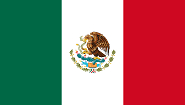Government/Policy

March 22, 2022
Mexico Keeps Duties on Russian, Romanian, Ukrainian Plate Imports
Written by David Schollaert
Mexico has extended for another five years its existing countervailing duties against imports of Russian, Romanian and Ukrainian steel plate. The trade policy has been in effect since 2005; the latest determination is retroactive to Sept. 22, 2020.
Following a filing from domestic producer Altos Horns de Mexico (AHMSA), the Mexican secretariat’s determination “established sufficient evidence” its steel industry would suffer injury should the antidumping measures expire.
The latest countervailing tariffs cover plate, medium plate, heavy plate, HRC steel plate, and cut-to-length steel plate products under HS codes 7208.51.04, 7208.52.01 and 7225.40.06.
Previously imposed compensatory quotas against Russia, Romania and Ukraine remain in effect, ranging from 36.8% to 60.1% depending on the product’s boron content, shape and thickness.
In 2021, Russia exported roughly 3.6 million tons or 12% of its semifinished and finished steel products into Mexico.
By David Schollaert, David@SteelMarketUpdate.com







